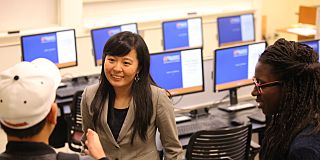GCOM 7230 provides an overview of the concepts, technologies, and tools necessary to support and improve electronic commerce, with emphasis on tools and methodologies for measuring and enhancing digital presence. The two major areas covered are web analytics and search analytics. Through a semesterlong group project, the course focuses on how these concepts can be used to measure, analyze, and improve user experience, web traffic, and conversion rates.
M.S. in Commerce | Academics
Business Analytics Track
Organizations use business analytics and artificial intelligence to improve decision-making, predict future trends, and generate business value. You’ll learn the analytics and AI skills, techniques, and practices required to design, create, and analyze organizational data—as well as the communication skills to report meaningful insights to diverse audiences effectively.
Coursework includes case studies, computer labs, seminars with industry leaders, and team projects solving real-world business problems. We provide students with key frameworks, technology skills, and functional proficiencies employers are seeking. Course topics include:
-
Employing a consulting-style approach to identify a client business problem/opportunity, apply data preparation methods, develop predictive AI models, and use descriptive analytics to deliver a proposed solution (including strategy and recommendations) for a client
-
Developing and executing strategies that build customer engagement, loyalty, and brand by utilizing customer analytics to gain actionable insights about customers both internal (employees) and external (customers) to an organization
-
Using AI and other quantitative modeling techniques to analyze data for improved decision-making
-
Identifying common pitfalls and risks related to AI and automated decision-making
-
Learning not only how to develop and deploy predictive AI tools, but also how to evaluate and manage them
Business Analytics Track Course Descriptions
Students will take GCOM 7230 and 12 credits from an approved list of courses, including primary track classes like the following:
GCOM 7230: Data Management for Decision Making (3 credits)
GCOM 7140: Customer Analytics (3 credits)
GCOM 7140 is a research-oriented class that examines how firms can leverage customer analytics to successfully create, manage, and grow brands. The class provides marketing managers and operational business leaders with the analytical tools to develop and operationally execute brand strategies that enhance customer engagement and loyalty.
GCOM 7210: Predictive Analytics with Low Code Technology (3 credits)
Business analytics leverages the vast data resources available today to identify trends and patterns that are critical to enhancing business performance. This course introduces students to contemporary business analytics methods, including predictive and descriptive analytics techniques, and demonstrates how to practically apply analytics to real-world business decisions.
GCOM 7214: Managerial View of AI (3 credits)
This course aims to provide students with a practical understanding of artificial intelligence technology. It covers key factors for the successful development, deployment, and management of AI, machine learning, and other algorithmic approaches to automated decision-making. Students will better understand the societal impacts of AI, ethical considerations in the use of AI, the limitations of AI, and approaches to balance AI risks and benefits.
GCOM 7240: Advanced Quantitative Analysis (3 credits)
This course provides multivariate statistics training to analyze big data sets. It covers discrete choice modeling (logistic and probit models), classification techniques (discriminant and cluster analyses), data reduction techniques (factor analysis), and advanced predictive techniques (regression models with interactions and curvilinear effects, structural equation modeling, and factorial ANOVA). It also trains students on IBM-SPSS, SAS, and R.
GCOM 7260: Unstructured Data Analytics (3 credits)
This course is focused on harnessing the power of unstructured data to perform advanced analytical techniques. Students are exposed to big data technologies (NoSQL, Hadoop, etc.) to understand how to manage and interact with large, complex data sets. Various analytical and machine learning techniques that can apply to these data are also covered, with particular attention to text data from reports, articles, and social media.
Electives
Students will also choose from a set of electives. Course availability is subject to program approval.
COMM 5161: Environmental, Social, and Governance Accounting (1.5 credits)
This course introduces students to sustainability reporting and environmental, social, and governance (ESG) issues, attempting to give a more expansive view of organizations’ financial, social, and environmental performance. Students will critically evaluate current sustainability metrics, attempt to quantify and compare firms’ sustainability efforts, and discuss the challenges behind adopting rigorous, universal sustainability standards.
COMM 5559: New Course in Commerce (1.5 credits)
Commerce for the Common Good courses (e.g., Race in Commerce; Value, Gender & Ambition at Work; Reimagining Global Capitalism)
GCOM 7215: Python for Data Science (1.5 credits)
The course provides an overview of the fundamentals necessary to conduct data analytics with Python, including understanding Python objects, data types, structures, packages, and data flow statements and reading, writing, manipulating, and plotting data. Students perform predictive analytics via machine learning using industry-standard packages.
GCOM 7216: Data Aggregation and Visualization (1.5 credits)
Students learn how to communicate effectively with data and data structures. This includes how to evaluate potential sources of data; aggregate data values from multiple sources; and compile creative, professional, and descriptive visualizations from that data. Students learn the best type of chart or figure for different situations and how to format those visualizations to maximize the impact to the viewer.
GCOM 7251: Essentials of Project Management (1.5 credits)
This course provides students with an introduction to how to effectively fill the role of project manager. It covers a blend of conceptual knowledge and practical skills necessary for the effective management of complex projects.
GCOM 7252: Consulting (1.5 credits)
This course provides a broad overview of management consulting and other related advisory services professions while also helping students develop skills that are broadly applicable in these professions as well as in other fields (business, politics, not-for-profit, etc.). Working both individually and in teams, students gain an appreciation of what makes consulting and advisory services unique from other areas of business.
Disclosure: The information contained on this website is for informational purposes only. The Undergraduate Record and Graduate Record represent the official repository for academic program requirements.


